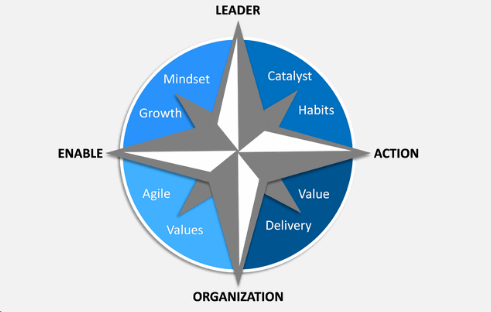We must put on many hats in order to perform the manager’s duties. We frequently find ourselves guiding our team members through circumstances that they have never faced before. With times changing, a manager’s role as a provider of guidance rather than a simple instructor has become more important. The manager is no longer viewed as a powerful individual who only gives orders. As an alternative, a manager can serve as a resource for guidance and instruction for staff.
For managers and leaders, coaching has become a crucial skill. This blog explains the benefits of coaching for managers and how it works. Understanding the skill will help management grow in their position and become better leaders. Therefore, continue reading if you’re looking for a way to develop your management skills or if you’re a leader looking for ways to better work with your team.
Table of Contents
What Are Management Skills?
The set of mental, interpersonal, and emotional abilities required for managing people is known as management skills. Detail-orientedness, problem-solving methods, decision-making procedures, communication skills, and team-building exercises are a few examples of these.
Managers can help employees develop these skills by coaching them. Because it enables them to offer advice and assistance when their employees need it most, it can be considered a crucial management skill. Any organization needs to have the qualities of a good manager and leader. Managers and leaders can successfully manage and lead their teams by investing the time to learn and practice these skills.
What is Coaching?
Managers can help employees develop specific skills by offering coaching as a form of support. Coaches typically work one-on-one with individuals, but managers can also modify the strategy for groups or teams.
Getting coaching education and advice has many advantages. According to SHRM, coaching in a business environment is a training method in which a more experienced or skilled individual provides an employee with advice and guidance intended to help develop the individual’s skills, performance, and career. This approach’s effectiveness depends on the coach and the client. However, it is a useful strategy for acquiring job-related skills and promoting communication between team members and managers.
In addition, leaders who transition into coaches can support their teams in a variety of ways. Google’s Project Oxygen has highlighted is a good coach as one of the necessities of becoming a good manager. Coaches can aid in the resolution of interpersonal conflicts in addition to offering crucial direction for tasks related to the workplace. Understanding and empathy help forge an emotional connection when the coaches have lived similar experiences to those of the employees. In the end, a relaxed atmosphere is established so that the staff can collaborate to produce the best outcomes for the team. The likelihood of active engagement and low turnover are also higher for staff who work in a supportive environment.
Read more: Leadership 6 by 6: Learn How to Be A Great Leader – Connect to Work

6 Benefits of Coaching for Managers
Add Depth to Your Knowledge
Managers who transition to coaching have a great chance to increase their knowledge. They are able to discuss a variety of subjects with the staff members. Additionally, they have the chance to talk about the latest developments and changes in the market. When you try to teach the same information to someone else, you will be able to see where your skills are lacking.
The coaching mode also aids in identifying areas of conceptual and contextual blindness. Your team members’ inquiries and questions may spark stimulating discussions in your head. With the nudge from an outside perspective, you can innovate and explore. It offers a chance for you to focus on continuous learning and skill development, both of which will aid in your professional development.
Understand Your People
You will gain unmatched insight into your employees’ inner workings as a coach. You’ll come to comprehend their motives and viewpoints. Additionally, as you interact with people on a daily basis, you gain knowledge of their strengths and weaknesses, which teams can use to their advantage for better outcomes. It gives you the power to shape your surroundings, ensuring that you remain inspired despite setbacks. In addition, managers need to be flexible in order to advance their careers because people constantly change and develop. A coach can facilitate interactions with people in various stages of development and foster close bonds with everyone. As a coach, you can take the best qualities of the team members and apply them to the overall plan.
Learn to Give Feedback
Giving feedback can be challenging for many people. This is due to how unsettling and unfair it feels. But in order to help the player improve, you must be able to give constructive criticism as a coach. Aim to offer corrective information rather than just criticism. You will gain knowledge that is useful for managers. You’ll have plenty of chances to practice giving feedback if you decide to become a coach. As a manager, you’ll also hone your analytical abilities to provide constructive criticism.
Become a Manager Who Leads by Example
Setting an example for your team members is crucial as a coach. This entails displaying a strong work ethic, remaining attentive during meetings, and taking the initiative to solve problems. By presenting a capable manager who leads by example, you can increase employee engagement. You must possess excellent people skills and the ability to deliver constructive criticism well if you want to succeed as a coach. Furthermore, setting a positive example for others is essential for raising employee engagement levels. Additionally, in a coaching relationship, you can instruct your team by setting an example. You consequently become a role model for employees.
Bring Out the Best in Your Team
It is your duty as a coach to assist people in realizing their full potential. You can accomplish this by praising them for their positive qualities. They will be able to grow into their best selves as a result of this. It would also be beneficial if you concentrated on coaching specific employees rather than managing entire teams. Building strong relationships with your employees through coaching enables you to better comprehend their needs. As a result, there is a greater level of engagement among the workforce because they perceive their manager as being considerate and perceptive. In addition, you can offer assistance as required. Overall, there are actions you can take to create the most effective team.
Become An Indispensable Asset for Your Organization
You are a valuable asset to any organization as a coach. This demonstrates how well-planned, methodical, and effective your work is. You can also establish trust with the team members through effective communication. Finally, you assume responsibility for your coaching responsibilities and fulfill the promises made to both parties upfront. The team will be able to depend on and respect your managerial or leadership abilities with these traits in place. For any organization, a manager who can also coach well is a great asset.
Why Are Manager Coaching Skills Important?
A manager’s coaching abilities are crucial to a team’s success. Successful coaching skills can help managers in the following ways:
- Boost team morale: You can use your manager’s coaching abilities to encourage and inspire your team members, which can enhance the work environment and boost team morale.
- Boost productivity: With effective coaching, all team members may perform their tasks more effectively, which can boost productivity. Your team’s performance can be enhanced with the aid of your coaching abilities.
- Setting clear goals for team members is a crucial component of coaching. Your team members may accomplish their individual or collective objectives with strong manager coaching abilities.
- Develop coaching skills to qualify for advanced positions. Many management positions favor or require coaching skills, so honing these abilities may help you land advanced management positions. These abilities can also be used to assist in preparing your team members for new or more challenging roles.
15 Types of Manager Coaching Skills
Here are 15 common coaching skills you can use in your manager career to inspire your team members’ growth:
1. Active Listening
Active listening is the capacity to pay close attention to and completely comprehend what another person is saying. Managers can use active listening when coaching team members to strengthen bonds and foster more fruitful dialogue.
By asking questions, you can put active listening into practice in your managerial career. Spend as much time as you can hearing the ideas and opinions of your team members. Asking your team members about their personal goals can be a good starting point when setting objectives. You can develop a personalized coaching plan or strategy using this feedback.
2. Empathy
Knowing another person’s feelings means having empathy. Building successful relationships requires having this ability. This ability can help managers build relationships with the members of their teams and design efficient coaching programs. Understanding each person’s unique needs and learning styles, for instance, could be helpful if you are a manager training new employees for additional responsibilities. Your ability to relate to and comprehend others depends on your capacity for empathy.
3. Adaptability
Having the capacity to adapt means being able to accept and handle change. Adaptability is a skill that managers can use to take on new challenges and deal with issues as they arise. By remaining adaptable in the face of change, you can demonstrate flexible thinking when coaching team members. For instance, you can use adaptability to effectively coach your team members if the deadline for a goal you set for them changes. Team members may follow your lead if they observe how well you manage the change.
4. Communication
The ability to effectively communicate is crucial for managers and coaches. Coaching team members can be done by managers using both verbal and nonverbal communication techniques. The next steps, expectations, and performance metrics may all be discussed verbally. They can motivate and inspire their team members through nonverbal cues like body language and eye contact. You can facilitate productive meetings, for instance, by using your presentation skills. You can set goals, verbally share team performance, and provide coaching to your team during meetings.
5. Feedback Skills
Managers can coach their teams to accomplish new objectives by using effective feedback techniques. Your ability to motivate your coworkers through constructive criticism may increase. Start by observing your team as a means of developing this skill. You can decide what to celebrate and where to make improvements by paying attention to what each team member is doing. Giving a team member positive feedback, for instance, if you see that they are exceeding their sales quota, can raise their spirits and increase productivity.
6. Compassion
Managers can coach their teams by using the relationship-building ability of compassion. The quality of compassion is empathy for others. Take the time to get to know your team members if you want to improve this skill. Connecting with them may be made easier by learning about their unique interests, preferences, and talents. For instance, planning a team-building activity could teach you more about your coworkers as people.
7. Positivity
The capacity to concentrate on a situation’s positive aspects is known as positivity or optimism. Managers can coach their teams members by being positive. For instance, you can motivate your team by using positive language when talking about goals and criticism. You can also use positive thinking to identify your team’s accomplishments. You could improve team morale and performance by highlighting the good work that each member of your team does.

8. Goal-setting Skills
You could coach your team members to achieve specific goals by developing their goal-setting skills. In addition to setting goals for their entire team, managers can also set objectives for specific team members. You can practice establishing specific goals to hone this skill. With regard to deadlines and performance standards, try to be as specific as you can. You can use this to track results, monitor progress, and adjust your goals as needed.
You might set a goal for your sales team, for instance, to sell 100 items in a given month if you are in charge of a sales team. You can monitor the number of items your team sells each day to determine whether they are on track to reach the objective. Your team members may be motivated to put in extra effort to accomplish this goal for the team if you communicate this goal and your progress to them.
9. Motivation
Managers can use motivation to guide their teams toward new objectives. You can coach your team members to success by using your motivational skills. Depending on your personality and leadership style, you may use motivation in a variety of ways throughout your managerial career. For instance, if you’re a confident leader, you might use your motivational speaking abilities to uplift your team.
Tracking goals publicly is another way to increase motivation at work. For instance, if you are in charge of a customer service team, you could use customer surveys to monitor and assess the performance of your team. To keep your team members motivated, share these with them on a regular basis.
10. Delegation
When managers or other team leaders assign tasks to team members, this is known as delegation. You might be able to coach your team more effectively if you learn how to delegate. You can express your respect and appreciation for your team members through delegation.
If you are in charge of a marketing team, you might, for instance, break down various campaign elements into smaller goals that various employees can work toward depending on their skills and preferences. A team member with skills in graphic design, for instance, could work on the new logo. Your team members may feel more trusted and appreciated if you give them new responsibilities.
11. Problem-solving
Managers can develop efficient coaching plans and strategies for their teams with the aid of problem-solving abilities. You can use your problem-solving abilities to come up with a workable solution, for instance, if you are the manager of a sales team that is struggling to meet its sales quota. To help your team overcome this obstacle, you can set individual objectives, deadlines, and metrics. You could request that each team member make four extra calls each week, for example. Your overall sales might rise as a result of this.
12. Persistence
A key component of being a successful leader is persistence, which is the capacity to overcome obstacles. Persistence will help you achieve your individual goals in your managerial career. Maintaining focus on your own objectives may inspire others on your team to accomplish their own objectives. If your team members observe the effort you put forth each day, for instance, you might motivate them to do the same.
You can reflect on your coaching tasks and make revisions with persistence as well. It might take some time and practice before a team member fully comprehends how to carry out a new task, for instance, if you are teaching them. Persistence will enable you to train your team members while remaining patient and upbeat.
13. Accountability
Managers who grow and exhibit accountability may be better coaches in the workplace. When team members respect and trust you, they might be more open to hearing your suggestions and recommendations. Being dependable is one way to demonstrate your accountability. To demonstrate to your team members that you value their time, for instance, you can schedule meetings to begin and end on time. You can convince your team that you are responsible and that they can rely on you by acting in this manner consistently. It might be simpler to coach and motivate them as a result.
14. Self-awareness
Understanding oneself and reflecting on one’s own preferences and habits is known as self-awareness. Self-aware managers are able to evaluate their leadership qualities and skills. Self-awareness entails taking stock of your advantages and potential improvement zones. You can make the necessary plans to assist in coaching your team by taking some time to consider your unique traits and abilities. You can use this skill to help you connect with your team, for instance, if you reflect and discover that you are an empathic person. You can work to develop this skill to advance your career if you think about it and decide that you’d like to speak with more assurance.
15. Organizational Skills
Being more organized might make you a more successful coach. Managers can assess team members’ personal goals and track and measure progress using their organizational skills. To assist you in measuring and tracking the development of your team, you might design a performance-tracking system or review procedure.
Conclusion
Because it enables them to develop professionally and enhance their skills, coaching is a crucial skill for managers and leaders. Additionally, it helps managers and executives comprehend their workforce, industry, and corporate objectives. Aspiring leaders can successfully develop their relationship and management skills by starting with a strong coaching relationship. Therefore, coaching is undoubtedly the way to go if you want to enhance your skill set or create a better management relationship. Keep checking back for more insightful information.





